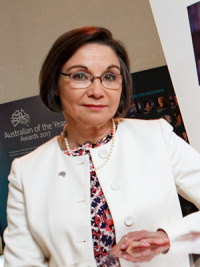
Kate Swaffer

- Ageing
- Female Speaker
- Health
- Issues
- Mental Health
- Wellbeing
Kate Swaffer has made a human rights-based approach to dementia, reducing stigma, and improving the quality of life for the 47.5 million people already diagnosed with dementia her focus over the last few years, and is changing the way the world views dementia.
Oh, and by the way, she herself is living beyond a diagnosis of a rare form of younger onset dementia, having been diagnosed at the age of 49 in 2008, a married working mother of two teenage sons, also studying a double degree at the University of South Australia at the time.
Kate is Chair, CEO, and co-founder of Dementia Alliance International, a global group for people living with dementia. She is also a member of the World Dementia Council, a Board member of Alzheimer’s Disease International, and the Inaugural Chair of the Alzheimer’s Australia Dementia Advisory Committee. Kate is also an honorary member of the Southern Dementia Advisory Group, having helped set up the Kiama Dementia Friendly Communities pilot project, also the only Dementia Friendly Community project in the world to have been recognised by the World Health Organisation.
Kate is also an Honorary Associate Fellow with the Faculty of Science, Medicine, and Health, University of Wollongong (UOW), and an International Fellow at Canterbury Christ Church University. Kate is also a current Ph.D. student at UOW exploring dementia through autoethnography and completed a Master of Science in Dementia Care there with a Distinction in 2014.
Kate has been on numerous local, national and international committees and groups, including the International Consortium for Health Outcomes Measurements (ICHOM), having worked on the global Standards for Dementia, and she is currently consulting on the World Health Organisation Draft Global Dementia Action Plan in her role as Chair and CEO of Dementia Alliance, representing more than 47.5 million people with dementia and their families.
Kate is a Humanitarian, advocate, and activist for people with dementia, a widely published academic, author and poet. Her first book on dementia, What The Hell Happened to My Brain?: Living Beyond Dementia. Her second book, Diagnosed with Alzheimer’s or another dementia, co-authored with Associate Professor Lee-Fay Low was released in time for World Alzheimer’s Month 2016.
Her first two poetry books were released, and her third one is on the way. Kate also writes an almost daily blog, currently with more than 60,000 subscribers, which was archived in the PANDORA Collection of the State (SA) and National Library of Australia in 2012.
- Diagnosing Dementia
- Dementia Risk Reduction
Kate has made remarkable progress in changing the face of dementia in less than four years since I have known her. Without a doubt, she has started to change the worldview of dementia and influenced and empowered others diagnosed with dementia to live more positively with it, rather than to do what many professionals in the health sector tell them to do, which is to go home and wait to die from it, via aged care...Kate’s voluntary work, and incredible drive, purpose, and passion to help create positive change for the 50 million people around the world currently (and the millions others soon to be) living with dementia as well as their families globally, has been truly noteworthy.
Kate is brilliant! We were privileged to have Kate present at our recent forum on human rights and dementia. Kate delivered a passionate and thought-provoking presentation, actively engaging participants and challenging their perceptions of dementia and current models of dementia care. Kate was able to share insights into her lived experience with dementia, as well as provide commentary from both national and international perspectives. Our event participants had nothing but positive feedback for Kate. We look forward to working with Kate again
Kate Swaffer is an outstanding inspirational speaker whose story is so gutsy that you marvel at her incredible willpower to live life to the fullest. Diagnosed with younger onset dementia at 49 she has become a global dementia activist determined to change people’s attitudes to dementia. Her words will linger in your thoughts long after she has finished speaking.